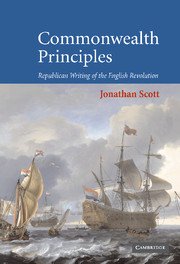Introduction: English republicanism
Published online by Cambridge University Press: 22 September 2009
Summary
… remembring, that we are now put into a better course, upon the Declared Interest of a Free State or Common-weal, I conceived nothing could more highly tend to the propogation of this Interest, and the honour of its Founders, then … that the People … may … understand what Common-weal Principles are, and thereby … learn to be true Common-wealth's men, and zealous against Monarchick Interest, in all its Appearances and Incroachments whatsoever.
Marchamont Nedham, Mercurius Politicus no. 92, March 1652.HISTORIOGRAPHY
The historiography of English republicanism is largely a creation of the past half-century. Before Zera Fink's ground-breaking The Classical Republicans (1945), such a general phenomenon had scarcely been identified. Attention to English republican thought was largely confined to James Harrington's The Commonwealth of Oceana (1656), a work intermittently famous since the year of its publication, and by 1950 at the centre of a renowned dispute about early modern English social development. Against this background it is not surprising that the most powerful impact of Fink's work should have been to furnish the most fertile context to date for our understanding of Harrington. By 1977, in the hugely influential analysis of John Pocock, Harrington had become not only ‘a classical republican’, but ‘England's premier civic humanist and Machiavellian’.
Pocock's achievement drew upon other important work.
- Type
- Chapter
- Information
- Commonwealth PrinciplesRepublican Writing of the English Revolution, pp. 1 - 16Publisher: Cambridge University PressPrint publication year: 2004

